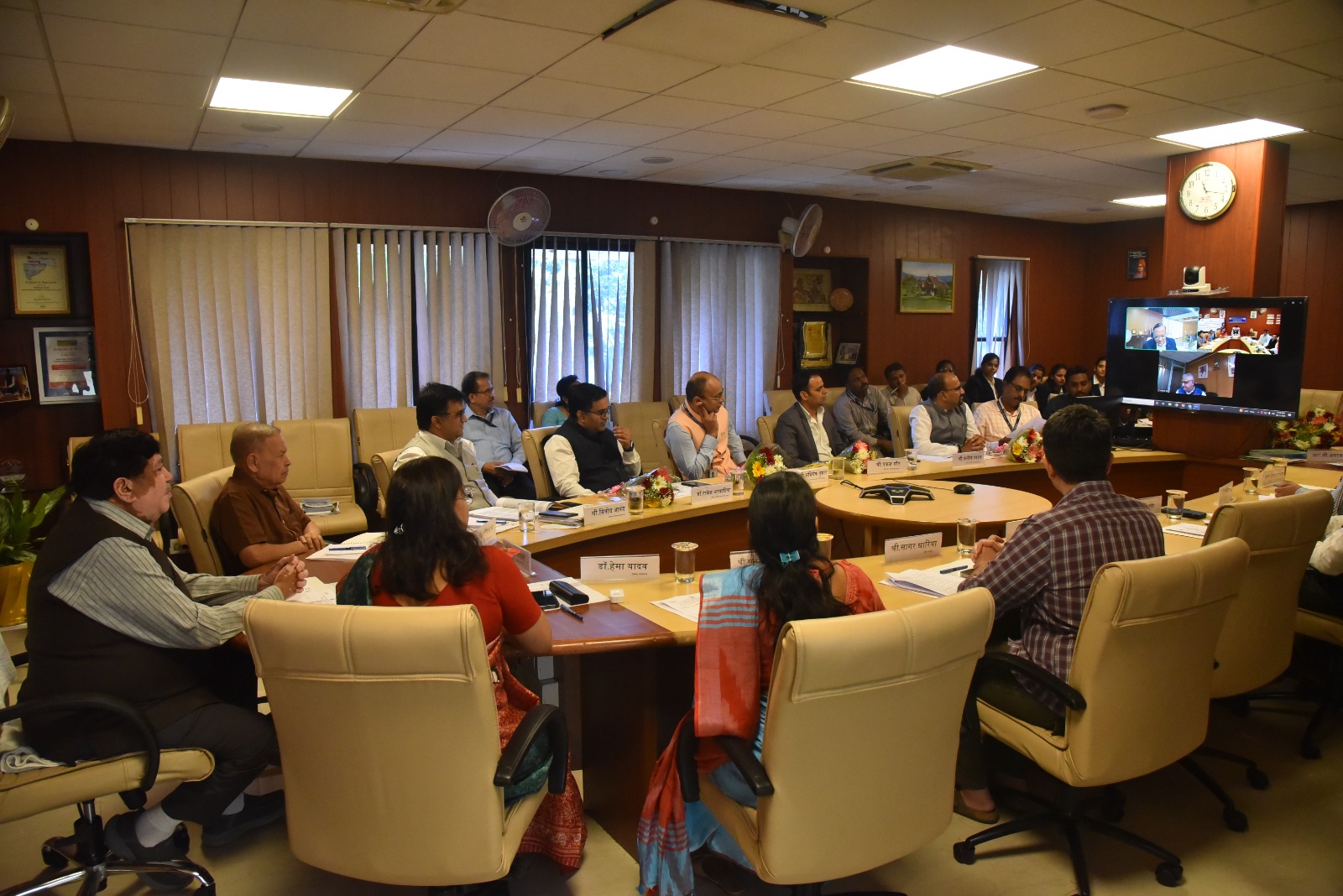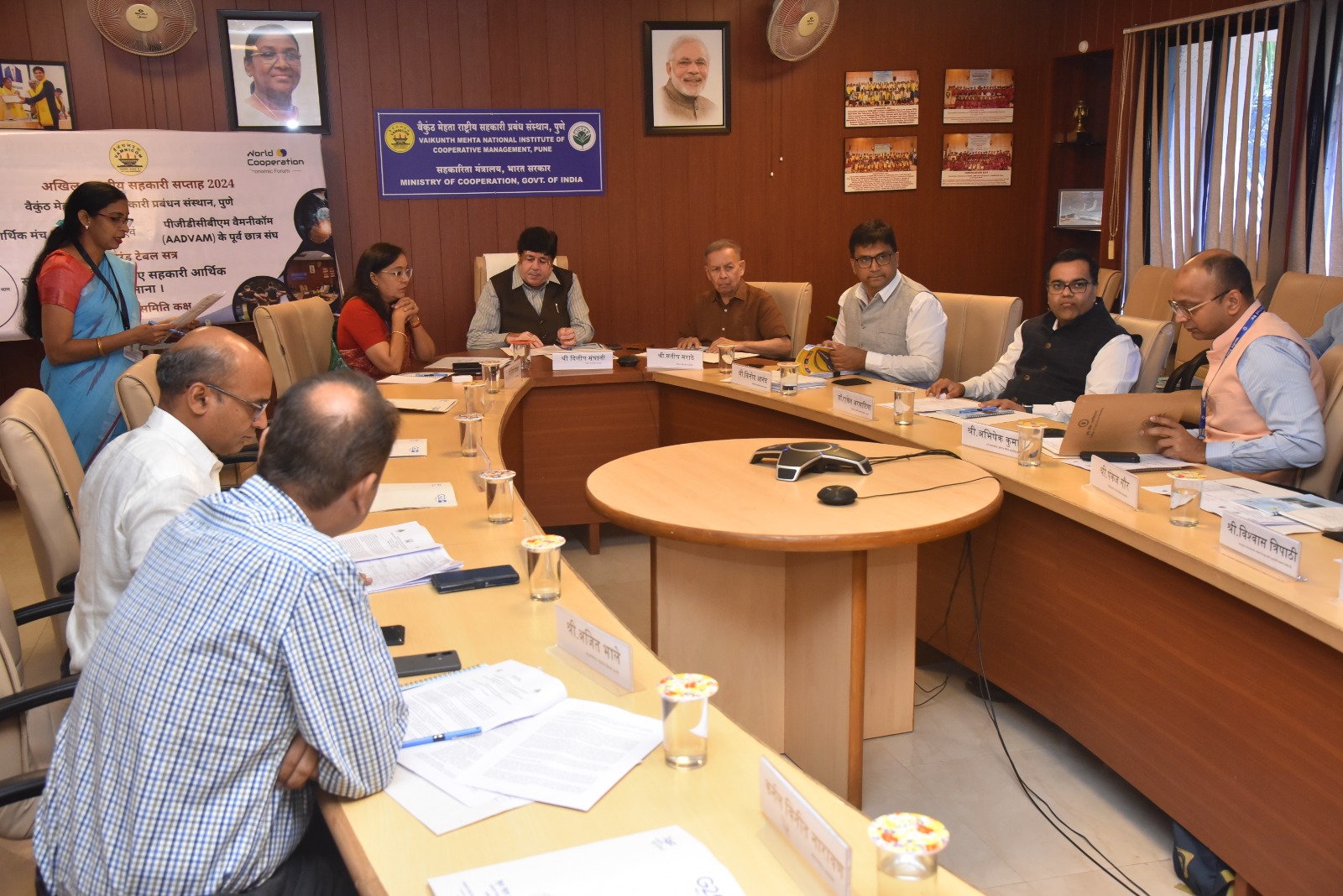Ministry of Cooperation
Roundtable on 'Creating a Cooperative Economic Framework for Sustainable Financing' Concludes Successfully at VAMNICOM, Pune
Posted On:
26 NOV 2024 2:13PM by PIB Mumbai
Pune, 26 November 2024
The National Roundtable session on "Creating a Cooperative Economic Framework for Sustainable Financing", held recently at Vaikunth Mehta National Institute of Cooperative Management (VAMNICOM), Pune, concluded with a resounding call for leveraging cooperatives as engines of sustainability and inclusivity.
Organized by VAMNICOM in collaboration with the World Cooperation Economic Forum (WCEF) and the Alumni Association of PGDCBM, the event brought together leaders, policymakers, and practitioners to chart a path toward integrating sustainability into cooperative economic frameworks.
8BB7.jpeg)
The event commenced with an impactful inaugural session attended by distinguished dignitaries. Shri Dileep Sanghani, Chairman of WCopEF, IFFCO, NCUI, and GUJCOMASOL, delivered the inaugural address, emphasizing the unique potential of cooperatives to promote sustainability in economic systems. He stated, “Cooperatives have a vital role in fostering economic growth while also championing green practices and inclusive development. It is essential to establish equitable guidelines that will enable the cooperative banking sector to contribute effectively to sustainable financing.”
Shri D.K. Singh (Retd. I.A.S.), Chairperson, Cooperative Election Authority, delivered the keynote address, emphasizing the necessity for policy-level integration of sustainable financing within cooperatives. He highlighted the importance of sustainable practices, addressing climate uncertainty, and discussing the focus on green elements in projects. Shri Anand Kumar Jha (I.F.S.), Joint Secretary of the Ministry of Cooperation, further underscored the significance of aligning cooperative goals with the United Nations Sustainable Development Goals (SDGs) and CooP29, while stressing the importance of green finance and financial inclusiveness.

The Chief Guest, Shri Satish Marathe, Director at the Reserve Bank of India, provided a macroeconomic perspective on leveraging cooperatives to build resilient economies. He shared insights on the developments that have taken place over the last four decades and outlined pathways for strengthening and making the cooperative sector more sustainable. He emphasized the need for institutional reforms and the importance of viewing the cooperative sector as an integrated entity. Furthermore, he highlighted the synergies between cooperative principles and sustainable financial practices.
The Roundtable brought together experts to discuss the evolving role of cooperatives in addressing modern challenges and fostering sustainable development. The discussions highlighted the unique strengths of cooperatives in tackling climate change risks, boosting local economic resilience, and reducing inequality. Experts emphasized the economic necessity of cooperatives and explored their advantages, the role of regulatory bodies like the Reserve Bank of India (RBI), opportunities for growth, and the challenges cooperatives are facing in a competitive global environment.

A key focus was on improving inclusivity within cooperatives by encouraging greater participation of women, youth, and marginalized communities. Panelists stressed the need for training and awareness programs, particularly for members of Primary Agricultural Cooperative Societies (PACS) and during Annual General Meetings (AGM). They called for policies promoting equitable governance and capacity-building initiatives to enhance the sustainability of cooperative institutions and their governance structures.
The discussions also delved into sustainable financing and the potential of green bonds as innovative investment tools for cooperatives and renewable energy projects. Challenges such as barriers to accessing green finance and the increasing role of District Central Cooperative Banks (DCCBs) in implementing the Core Banking System (CBS) were explored. Insights were shared on the National Cooperative Development Corporation (NCDC)’s involvement in green financing and strategies to reduce non-performing assets (NPAs) while supporting crop loans.
Finally, the transformative role of technology in cooperatives was a significant highlight. Innovations such as blockchain, IoT, and e-commerce platforms were discussed as game-changers for cooperative operations. Strategies to enhance digital payment systems, bridge infrastructure gaps, and improve digital literacy in rural cooperatives were also presented, showcasing how technology can address challenges and unlock the potential of cooperatives in the modern economy.
ZVP4.jpeg)
The roundtable featured a diverse panel of experts from various sectors, including representatives from the Ministry of Health and Family Welfare (MoHFW), IRMA, College of Agricultural Banking, Vanarai, DWARA, Registrar of Cooperative Societies, NABARD, NCDC, Cosmos Bank, and Mettarev Systems.
The National Roundtable was presided over by Dr. Hema Yadav, Director, VAMNICOM, and concluded with a wrap-up session led by Shri Binod Anand, Founder Executive-President of WCEF. Discussions focused on actionable steps, including policy frameworks for green financing, capacity building for digital adoption and inclusivity, and fostering collaborative networks to share best practices and drive innovation. Dr. Pallavi Ingale, Organizing Secretary, concluded the session with a vote of thanks, appreciating the valuable contributions of all participants.
* * *
PIB Pune | H.Akude/D.Rane
Follow us on social media:
@PIBMumbai  /PIBMumbai
/PIBMumbai  /pibmumbai
/pibmumbai  pibmumbai[at]gmail[dot]com
pibmumbai[at]gmail[dot]com  /PIBMumbai
/PIBMumbai  /pibmumbai
/pibmumbai
(Release ID: 2077373)
Visitor Counter : 167